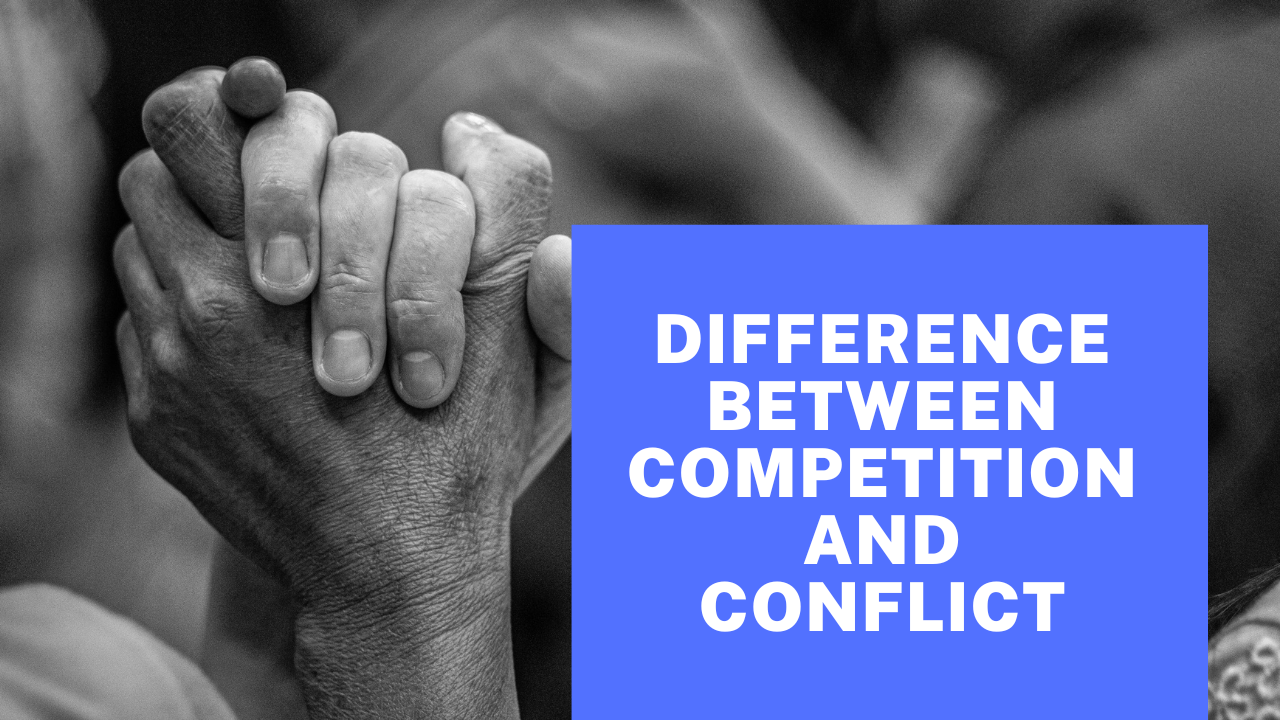Different between Competition and Conflict in Organizational Behavior
In everyday life, especially in workplaces and other group settings, competition and conflict are two common experiences that shape the way people interact with each other. Although they may seem similar, competition and conflict are quite different in the way they work and their effects on people.
Competition is an ongoing process where individuals or groups try to outdo each other. This can lead to positive outcomes such as hard work, improvement, and success. Conflict, on the other hand, arises when people have disagreements or conflicts of interest. Unlike competition, conflict is not ongoing – it eventually needs to be resolved so everyone can move forward.
Understanding the difference between competition and conflict is important. It helps us create environments where healthy competition can motivate people to do their best, while conflicts can be managed in such a way that they do not cause lasting damage. This introduction will explain these differences in simple terms, showing how each affects people and what can be done to handle them effectively.
Table of Contents
Different between Competition and Conflict
| Competition | Conflict |
| It is a continuous process It is never ending process; competitor must be strong enough to compete with each other to get better outcome. | It is not a continuous process At some stage it must come to an end, after taking proper mutual decision conflict comes to an end. |
| It is unconscious Individuals are not aware of it. | It is conscious Individual are aware and know each other very well. |
| It encourages hard work As they have to compete with each other, they focus on targets and for this they work hard. | It discourages hard work Too much of argument in the organization create lack of interest in the minds of individual to work hard. |
| Impersonal in nature The attention of the individual is concentrated on the object or the goal. | Personal in nature Concentration is on person rather than object, to make another person weaker they attack them personally. |
Understanding Conflict and Competition: A Simple Explanation
Conflict and competition are two common aspects of how people interact with each other, especially in workplaces or group settings. Although they may seem similar at times, they are actually quite different in the way they work and affect people. Let’s look at these differences in an easy-to-understand way:
1. Nature of the Process
Competition: A Continuous Process
Competition is something that never really stops. In a competitive environment, people or teams are always trying to do better than others. The presence of strong competitors motivates everyone to improve, come up with new ideas, and work hard to achieve the best results. This constant striving for excellence makes competition a regular part of environments such as businesses, sports, and schools.
Example: In a sales team, members may always try to be the top seller each month. This competition encourages them to keep improving their sales techniques, learn new strategies, and motivate themselves to do better than their peers.
Conflict: A Temporary Process
On the other hand, conflict doesn’t last forever. It happens when people disagree or have different interests, but eventually it needs to be resolved. Resolving conflict usually involves discussions, compromises, or decisions that help everyone move on from the disagreement. This resolution is key to bringing back peace and allowing everyone to work together again.
Example: Two departments in a company may argue about how resources should be shared. After several meetings and discussions, they reach an agreement that works for both parties, ending the conflict.
2. Level of Awareness
Competition: An Unconscious Process
Competition often occurs without people even realizing it. They may not think about the fact that they are competing; instead, they focus on achieving their goals. The desire to compete is embedded in their actions and decisions, even if they don’t admit it openly.
Example: An employee may compete with a coworker without thinking – by trying to meet a deadline early or take on a difficult project – simply because they want to do their best.
Conflict: A Conscious Process
Conflict is different because it is something people are very aware of. When a conflict occurs, the people involved know exactly what the disagreement is about and are often very aware of each other’s feelings, actions, and intentions. This awareness makes the conflict more personal and harder to ignore, requiring resolution to move forward.
Example: When two team members disagree about how to proceed on a project, they are both fully aware of each other’s opinions and the specific issues causing the conflict.
3. Effects on Work Ethic
Competition: Encourages Hard Work
In a competitive environment, the desire to do better than others motivate people to work hard. The desire to reach goals, gain recognition, or win awards motivates individuals to put in extra effort. This competitive spirit often leads to greater productivity, new ideas, and better overall performance in an organization.
Example: A student who wants to be at the top of the class will study more, use additional resources, and work constantly to improve their knowledge to stay ahead of the competition.
Conflict: Discourages Hard Work
When conflict lasts too long or becomes too intense, it can reduce people’s motivation to work hard. Instead of focusing on their tasks, people become caught up in arguments or disputes, which can lead to a loss of interest in their work. This distraction can result in reduced effort and low morale. If conflicts are not resolved, it can lead to people missing work or quitting their jobs.
Example: Employees who are always arguing with their manager about unclear job roles may lose motivation to do their job well, which can lead to a drop in productivity.
4. Focus of attention
Competition: Impersonal in nature
Competition is typically impersonal, meaning the focus is on achieving goals, accomplishing objectives, or reaching targets, rather than on personal relationships. Competitors are more concerned with what needs to be done, and their interactions are often based on results and performance rather than personal matters.
Example: In a sports competition, athletes focus on winning the game or achieving a personal best, rather than on their relationships with other competitors.
Conflict: Personal in nature
Conflict is much more personal. The people involved focus on each other, rather than on solving the problem or reaching the goal. This focus on the person can lead to negative behavior, such as personal attacks, blame, or attempts to undermine the other person. As a result, conflict often becomes more about undermining the other person rather than fixing the problem.
Example: In a dispute between two co-workers at work, they may begin to criticize each other’s character or work ethic rather than addressing the specific issue that caused the disagreement.
Frequently Asked Questions on Understanding Conflict and Competition
What is the difference between competition and conflict?
How does competition affect work?
How does conflict affect work?
Do people always know they are competing?
Do people always know about conflict?
Why is it important to know the difference between competition and conflict?
Conclusion on Understanding Conflict and Competition
Understanding the difference between conflict and competition is essential to effectively manage interactions in organizations and personal relationships. While competition can motivate people to excel and innovate, conflict needs to be handled carefully to prevent it from disrupting work and harmony. By recognizing these differences, we can create environments where healthy competition helps everyone perform at their best, and conflicts are resolved in a way that keeps things running smoothly.








Thanks for sharing. I read many of your blog posts, cool, your blog is very good. https://accounts.binance.com/ES_la/register?ref=T7KCZASX
Very nice post. I just stumbled upon your blog and wanted to say that I’ve really enjoyed browsing your blog posts. In any case I’ll be subscribing to your feed and I hope you write again soon!